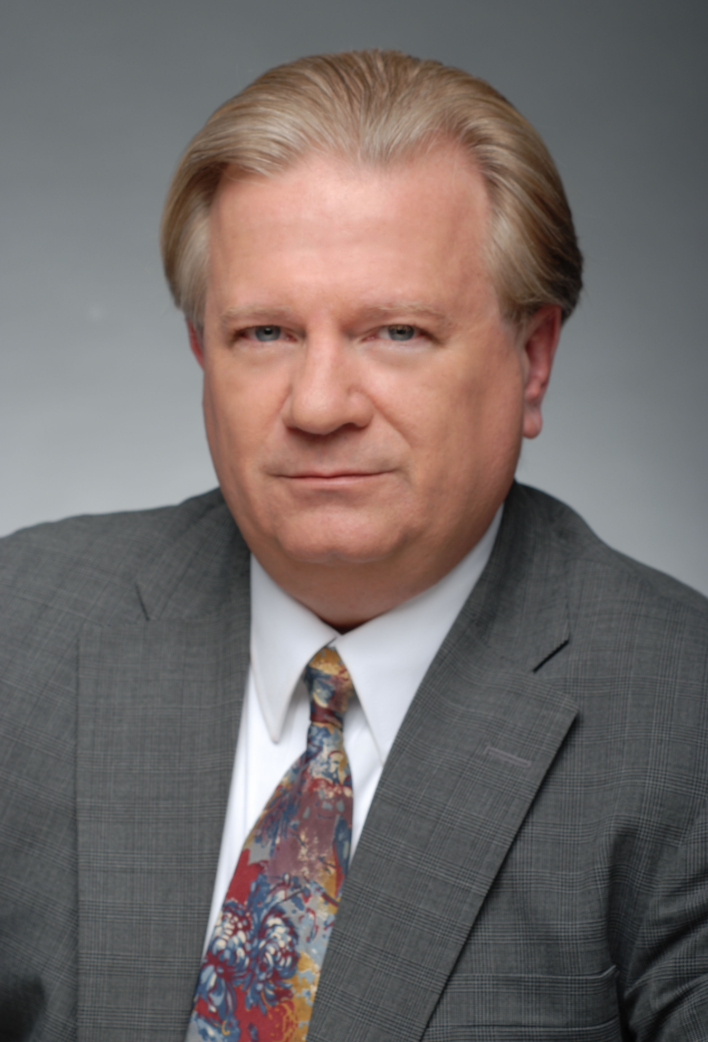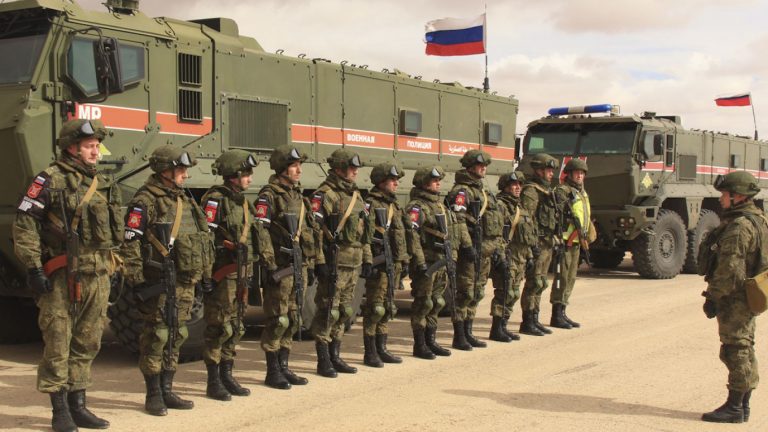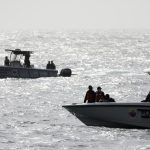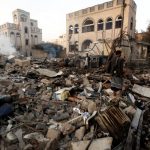Why is Moscow continuing to send troops to fight and die in the deserts of Syria while simultaneously fighting the rapidly growing Covid-19 pandemic at home? Russian military forces, both regular military and civilian contract fighters, have been supporting Syrian President Bashar al-Assad in his fight against several independent rebel forces since the inception of the Syrian civil war in March of 2011. With Russia already reeling from the early, but increasingly deadly stages of the Covid-19 pandemic across the Russian Federation, why is Moscow maintaining its substantial military involvement in a distant civil war? One theory held that there was the need to rouse public support for the recently postponed sham vote to confirm Vladimir Putin as lifetime president. A strong show of military might against a foreign foe for whatever reason, dubious or otherwise, has always been successful to rally the Russian population behind their leaders. Another possibility is the tried and true Soviet practice of deception: deflection from the real problem, in this case the coronavirus pandemic and the catastrophically poor response by the Russian public healthcare system. Putin was betting that Syria would prove to be no exception to playing by the old Soviet rulebook.
Although Russian support for al-Assad has at times been mutually beneficial for both Moscow and Damascus, it has not been without its problems, especially for Moscow. From deadly military confrontations with both Turkish and American forces, to a growing anti-war sentiment among young and middle-class Russians back home, especially among parents with sons of military age and their families. For these families, foreign military actions of questionable necessity have become far less popular.
So what exactly is Moscow doing in faraway Syria? As already stated, historically, as is true in many countries, a strong demonstration of military might always seems to rally the Russian population behind their leaders, at least temporarily. Although that meaningless vote for Putin’s lifetime presidency, originally scheduled for April 22nd,has been indefinitely postponed due to the Covid-19 pandemic, Putin’s need to drum up public support to grant him some kind of official seal of approval for his coronation will still exist. Now that the perfunctory vote will not happen, it is unknown at this time how or when he will seek validation for his elevation to what is essentially Czar status. However, even without the public vote, Putin has already placed himself in a comfortable position moving forward.
In the quest to achieve his goals, Putin has successfully tapped into the two important Russian psychological needs: 1) The need for Russia to be taken seriously on the world stage as an important international player: 2) The ever present Russia paranoia to project a strong military force to the world in order to intimidate any would be invaders who might have designs on attacking, occupying and plundering Mother Russia. These are very real and integral parts of the Russian national psyche that political leaders ignore at their own peril. President Vladimir Putin not only acknowledges those deeply rooted cultural sentiments, but he leverages them to his advantage at every opportunity – like the civil war in Syria.
Achieving the desired outcome in this risky endeavor presents several political minefields that Moscow will have to successfully navigate. One such obstacle is Turkey. This once and perhaps future Russian friend is allied with the Syrian opposition, thus placing it at odds with Russian forces trying to keep al-Assad in power. As already pointed out earlier, this situation has already brought Russian and Turkish forces into direct conflict with each other and will no doubt do so again in the future. Since Turkey is a key member of NATO, Putin is especially anxious to woe Ankara into the Russian sphere of influence by driving a wedge between Ankara, Brussels and Washington. The sale of an anti-aircraft system to Turkey last year went a long way in doing just that. In addition, recent events have seemed to bring Moscow and Ankara closer together on the issue of Syria. This can only strengthen Putin’s hand both internationally and with his domestic audience.
If Kremlin watchers thought that the Covid-19 pandemic would cause Putin to slow down or pause his aggressive military actions around the world, including in Syria, they have been proven wrong. If anything, the crisis has emboldened him to increase his actions internationally. This is especially true for the campaign in Syria, where Russia has a long history of arms sales and military cooperation, including a Russian naval base on Syria’s Mediterranean coast, one of the few that allow Russian warships a year-round warm water port. Russia is in Syria for the long haul.
This would all seem to indicate that Putin is not in any state of mind to press the pause button right now.If anything, the current health emergency sweeping Russia and the rest of the world has given Putin the perfect opportunity to double down on his foreign military campaigns. As with everything Mr. Putin does, there is more than one reason for his actions. Syria provides him with at least two good justifications.
First, keeping his military forces deployed and actively engaged in Syria is the perfect Wag the Dog scenario. It refocuses and then deflects Russian public attention from their everyday suffering. Added to their usual misery from poverty level salaries, massive corruption at every level, dangerous, old Stalin era housing, and a crumbling infrastructure, now they have the additional daily nightmare caused by the coronavirus pandemic. The average Russian citizen must now brave the new strict quarantine measures imposed by the government while daily learning about the massive failure of the public healthcare system to first recognize and then to act on the rapidly spreading pandemic. These serious, life and death health related issues now take up the majority of every waking hour for many Russian people (especially in Moscow and St. Petersburg), thereby not giving them the time or energy to consider too much of anything else, like politics or foreign affairs. This works out very well for Putin. Additionally, the military actions in Syria generate a predictable amount of patriotic feelings among a sizable number of the population who view the flexing of Russian military muscle on the international stage as inspiring and a positive sign that they have wisely placed their faith in a strong leader who will protect them against a world that is always at their doorstep, waiting to pounce at the first sign of weakness.
These are all actions straight out of the Putin (and Soviet) political playbook, actions that have worked well for him for the past twenty years and will no doubt be dusted off and used again to positive effect for perhaps another twenty years, or even longer. The only possible glitch in this strategy is the coronavirus. That was not anticipated, even by Putin. It should not be a deal breaker, however. After all, there are still many countries on several continents that will probably require some Russian military assistance in the near future.
Author
-

Retired U.S. Army Counterintelligence Special Agent. He served in Iraq as a team leader of a tactical Human Intelligence Team (THT). Prior to his deployment to Iraq, David was an instructor at the reserve U.S. Army Counterintelligence Special Agent course. He has published four novels for Grand Central Publishing and is currently finishing a memoir of his experience in Iraq. David has also written articles for Vanity Fair, Salon.com, The American Prospect and The Washington Monthly.
View all posts




